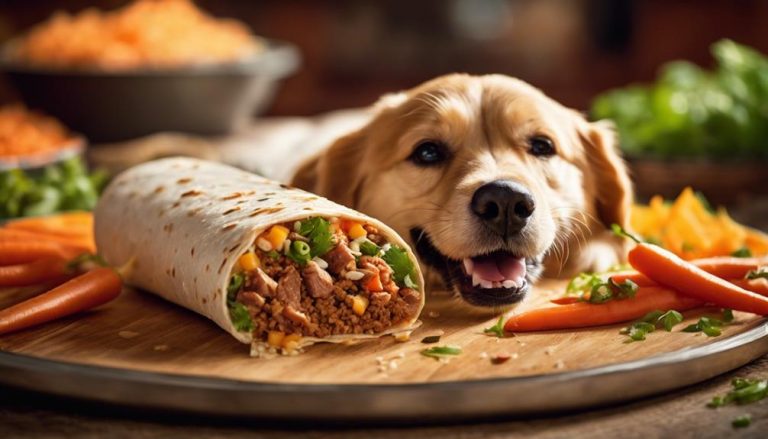Burritos: Safe for Dogs or No?
Giving dogs burritos isn’t a good idea because of the ingredients they often contain. Onions and garlic, for example, can cause serious health problems like anemia in dogs. Spicy seasonings might upset their stomachs, and the high salt content and tortillas can be challenging to digest. Cheese and hot peppers aren’t tremendous and might lead to sickness and digestive issues.
There are much safer food options for your dog. For instance, plain cooked chicken or beef and some vegetables like sweet potatoes and green beans are healthy choices. If you’re unsure about what to feed your dog, it’s always best to talk to a vet. They can give you advice on what foods are nutritious and safe for your dog, helping you steer clear of those that could cause harm.
Key Takeaways
- Onions, garlic, and spices in burritos are harmful to dogs.
- High salt and dairy intake from burritos upset their stomach.
- Dogs struggle to digest tortillas, causing stomach discomfort.
Understanding Burrito Ingredients
Checking the ingredients of a burrito before sharing it with your dog is crucial. Some items typically found in burritos can be harmful to dogs. Onions and garlic, for instance, can lead to serious health issues for your pet, including gastrointestinal problems. Spices common in burritos might not sit well with your dog’s stomach either.
High levels of salt in these wraps can upset a dog’s stomach. The tortillas, made of flour or corn, are hard for dogs to digest. Cheese and hot peppers, often critical burrito parts, could make your dog uncomfortable or sick. Given these facts, it’s wiser to keep burritos away from dogs.
Toxic Ingredients in Burritos
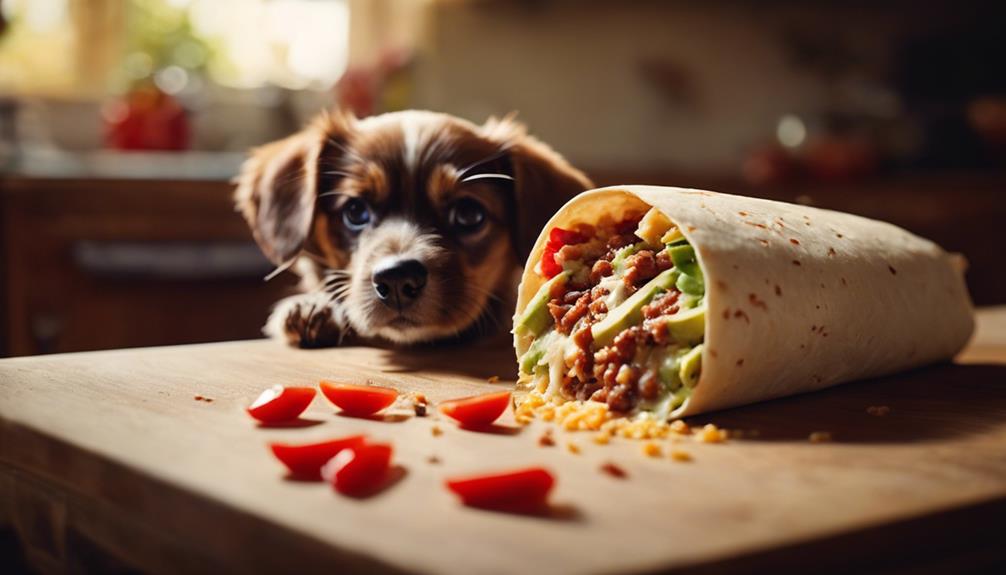
Be cautious if you’re considering sharing a burrito with your dog. Some ingredients in this popular meal can harm your dog. Spices, which give burritos their flavor, can upset a dog’s stomach and lead to health problems. High salt levels in these dishes can also cause stomach issues, worsening the situation.
Onions are another ingredient to watch out for. They can cause anemia in dogs, which is a severe health condition. Both flour and corn tortillas, standard in burritos, might not be toxic, but they’re not suitable for dogs. They can lead to an upset stomach.
Safe Alternatives for Dogs
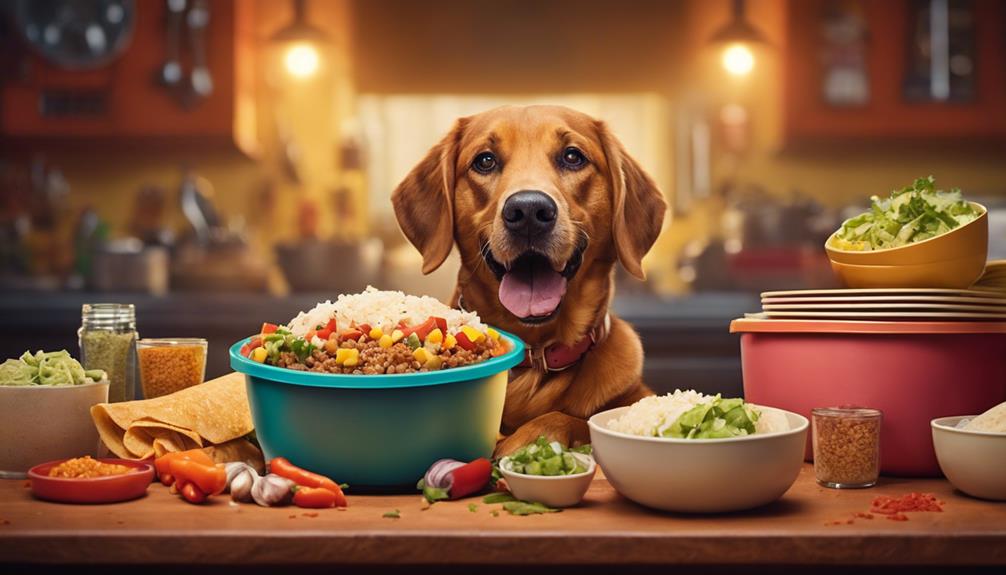
Feeding burritos to dogs isn’t safe, so finding healthy alternatives is essential. Let’s look at what’s best for our canine friends.
Safe and Nutritious Picks for Dogs
- Plain Cooked Chicken or Beef: These are great because they’re full of protein and easy for dogs to digest.
- Sweet Potatoes and Green Beans: These veggies are packed with nutrients and perfect for making home dog treats.
- Dog Treats That Are Good for Them: Whether you make them yourself following vet-approved recipes or picking up natural commercial options, the proper treats can keep your dog happy and healthy.
Talking to your vet about what snacks are best for your dog is always a good idea. Choosing options like plain cooked chicken, beef, sweet potatoes, green beans, or approved dog treats helps keep them in shape. Picking commercial treats made with natural ingredients gives your dog a safe and nutritious snack.
The Risks of Spices and Sauces
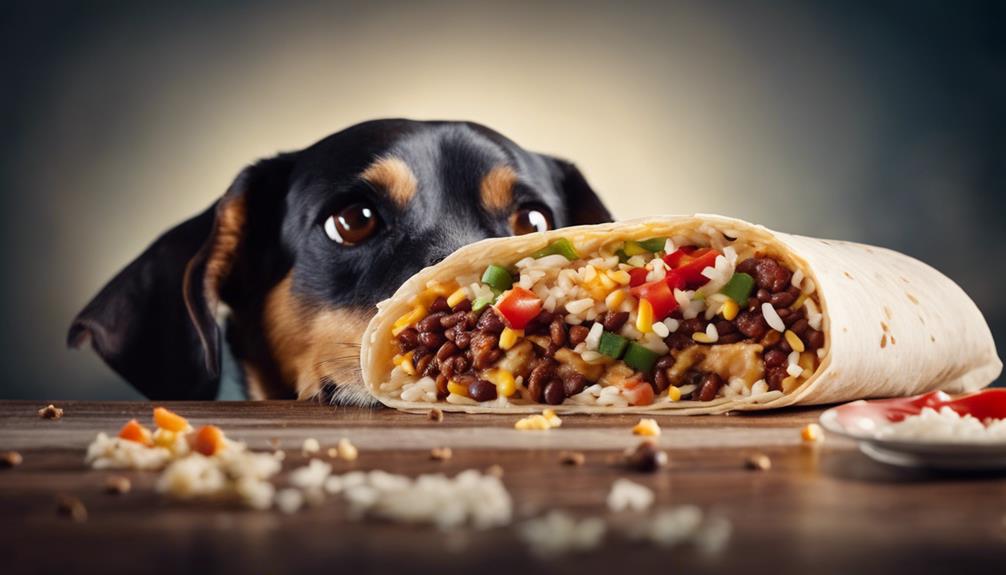
Knowing the dangers spices and sauces in burritos pose to dogs is crucial for pet owners. These ingredients can cause serious digestive issues for our canine companions.
Spices often lead to stomach upset in dogs. It’s best to avoid them to keep your dog healthy. Sauces in burritos might have garlic or onions, which harm dogs. Eating these can cause diarrhea or vomiting in your pet. The spicy components of burritos are hazardous and can upset a dog’s stomach. Sticking to safe foods is essential to protect your dog’s health.
Impact of Cheese and Dairy
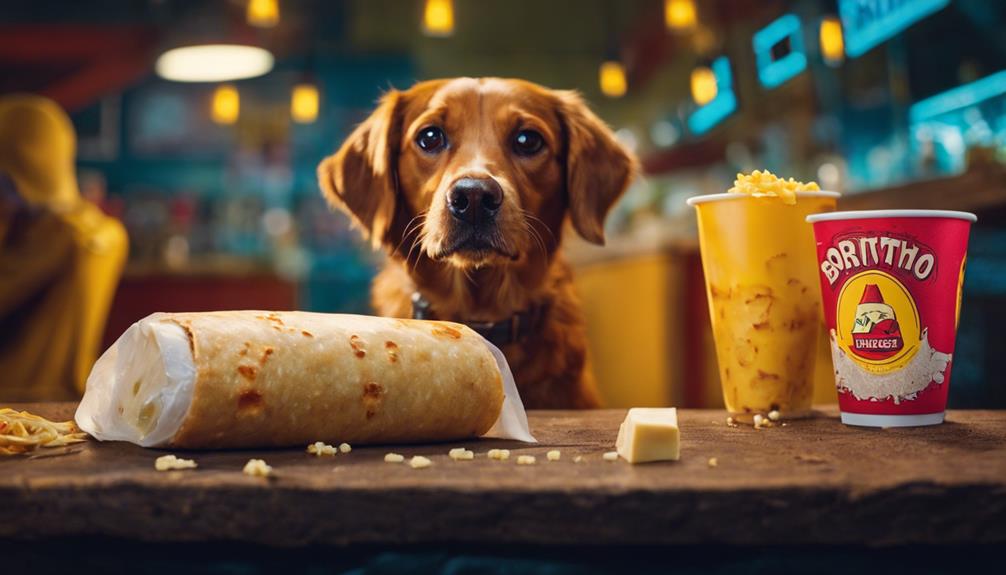
Cheese and dairy products are often favorites for burrito fillings, but they’re not the best choice for dogs. Many dogs can’t handle lactose, the sugar in cheese and dairy because they don’t have enough of the enzyme that breaks it down. This can cause uncomfortable stomach problems like diarrhea, gas, and bloating. While a tiny bit of cheese might not upset every dog, it’s generally better to avoid giving these foods to them regularly. The risks to their health are more significant than any benefit they might get.
Instead, when making burritos for your dog, opt for dog-safe ingredients. Plain-cooked meats or vegetables are much safer and more accessible for dogs to digest. They provide valuable nutrients without the risk of stomach upset. This way, your pet can still enjoy a tasty treat without discomfort.
Beans: Nutritional Benefits and Risks
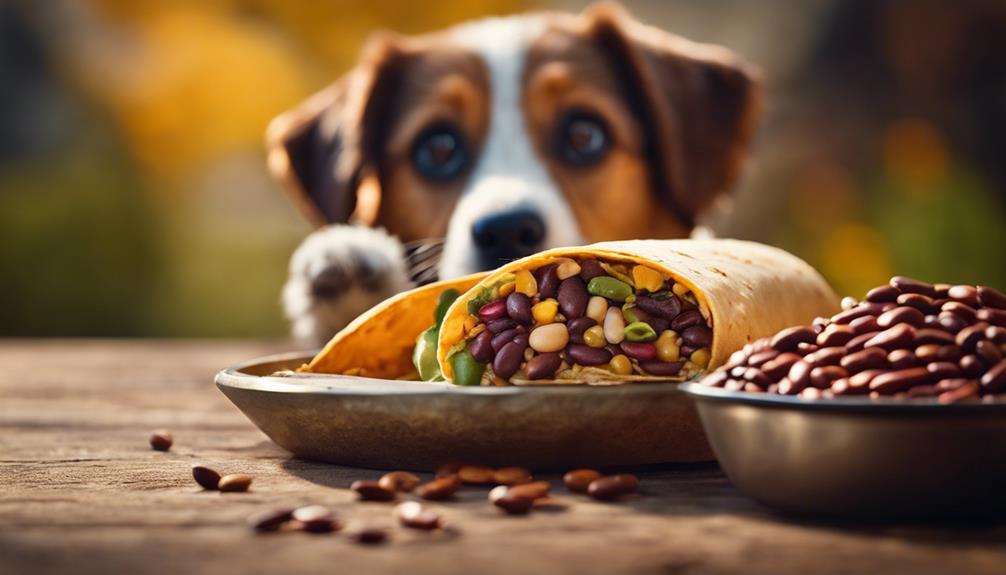
When considering beans as part of a dog’s diet, looking at both the good and the bad is vital. Like the black and pinto types, beans are packed with protein and fiber. These nutrients are great for dogs, helping their digestion and ensuring they get a well-rounded meal.
Yet, it’s crucial to prepare beans for dogs correctly. They must be plain, cooked without any spices or extras, and given in small amounts. This approach helps prevent any stomach issues for your pup.
Beans: Health Advantages
Adding beans to your dog’s diet can be a great way to improve their nutrition. Beans are packed with protein, fiber, iron, magnesium, and folate, all vital for your dog’s health. It’s essential to ensure that beans are cooked and unseasoned before serving them to your pet. This is because raw kidney beans contain toxins that can be harmful.
Beans help increase protein levels, which is vital to repairing muscles and tissues. The fiber in beans aids in keeping your dog’s digestive system running smoothly. They can also help manage blood sugar levels, making them a good choice for dogs with diabetes. Beans are rich in minerals like iron and magnesium, which support various body functions. Folate, found in beans, is crucial for cell growth and metabolism.
Make sure only to serve cooked beans to avoid any health issues. Avoid raw kidney beans to keep your pet safe.
Beans: Potential Dangers
Understanding the nutritional benefits of beans for dogs is crucial, but it’s just as important to be aware of the risks. Beans are a great source of protein and fiber, but they can be harmful if not cooked correctly. Beans like black, pinto, and kidney can be suitable for dogs, but they must be prepared without any unsafe ingredients. For instance, seasonings common in refried beans can cause adverse reactions in dogs.
When adding beans to your dog’s diet, it’s vital to introduce them slowly. This helps avoid digestive problems. Always observe your dog for any signs of intolerance or allergic reactions. It’s essential to ensure that beans are a safe addition to their meals, ensuring they contribute to their health rather than harm it.
Preparing Dog-Friendly Burritos
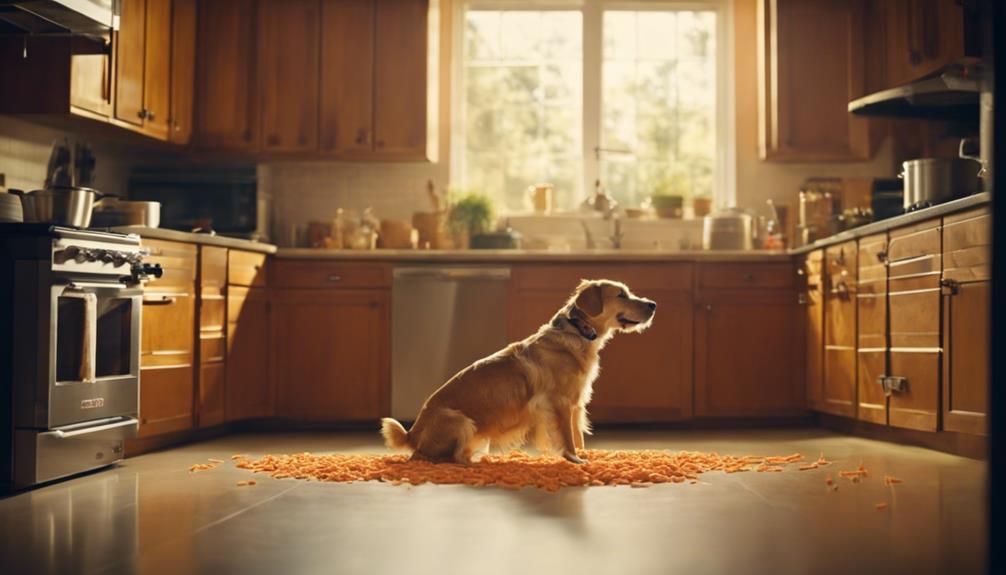
When making burritos for dogs, it’s crucial to pick safe ingredients and avoid anything that could harm their health. Use simple cooking methods to prepare plain proteins such as chicken or beef. Add fillings like sweet potatoes or green beans, which are delicious but also nutritious and safe for dogs.
Consulting vet-approved recipes or opting for natural commercial dog treats can help ensure your pet’s dietary needs are met safely.
Choosing the right ingredients and cooking methods can make all the difference in ensuring your dog enjoys their meal without any health risks. This approach keeps your pet healthy and gives you peace of mind.
Selecting Safe Ingredients
When crafting dog-friendly burritos, picking ingredients that won’t harm your pet is crucial. Opt for plain cooked chicken or beef, including veggies like sweet potatoes or green beans, steering clear of dangerous additions such as onions or garlic. This approach ensures your furry companion can enjoy a tasty and nutritious snack without worrying about ingesting anything toxic or overly salty.
- Use plain cooked chicken or beef for a safe source of protein.
- Fill them with sweet potatoes or green beans.
- Keep onions and garlic out of the recipe, as they’re unsafe for dogs.
- Try making treats at home with recipes approved by veterinarians.
- Asking a vet for advice on healthy ingredients is a wise move.
Ensuring your dog’s treats are made with the right ingredients is not just about avoiding the bad stuff but combining the correct elements to provide a balanced and enjoyable meal. Consulting with your vet can give you peace of mind, knowing you’re offering the best to your dog.
Avoiding Harmful Additives
Ensuring your dog’s health and safety means avoiding ingredients like onions, garlic, and too many spices in their food. Choosing safe ingredients and talking to a vet when making homemade dog treats is better. Vets can recommend recipes that use natural ingredients, making them a healthier choice than store-bought treats that might contain harmful additives. You can also find commercial dog treats made with natural ingredients, which are tasty and won’t harm your dog.
| Safe Ingredients | Avoid | Consideration |
|---|---|---|
| Plain cooked chicken | Onions and Garlic | Consult vet |
| Beef | Excessive spices | Vet-approved recipes |
| Sweet potatoes | – | Homemade dog treats |
| Green beans | – | Commercial dog treats |
It’s crucial to pick the right ingredients for your dog’s meals and treats. Sticking to vet-approved choices ensures your dog enjoys their food without any health risks. Making your dog treats or selecting the right commercial ones can keep your dog healthy and happy.
Cooking Techniques Simplified
When preparing meals for your dog, like dog-friendly burritos, it’s vital to choose ingredients that are not only healthy but also safe. This means cooking them in ways that maintain their nutritional value while ensuring they’re palatable for your pet.
For proteins like chicken or beef, ensure they’re fully cooked without any spices or dangerous additions such as onions or garlic, which are toxic to dogs. Sweet potatoes should be steamed or boiled until they’re soft, and it’s important not to add sugar or salt. Similarly, green beans should be cooked until tender, with no seasonings added.
It’s crucial to avoid ingredients that could harm your dog. Always check that recipes do not include cheese, spicy peppers, or other additives that dogs should not consume. Including homemade dog treats in the burrito can be a great way to add extra nutrition. These should also be made with safe, wholesome ingredients.
Emergency Steps After Ingestion
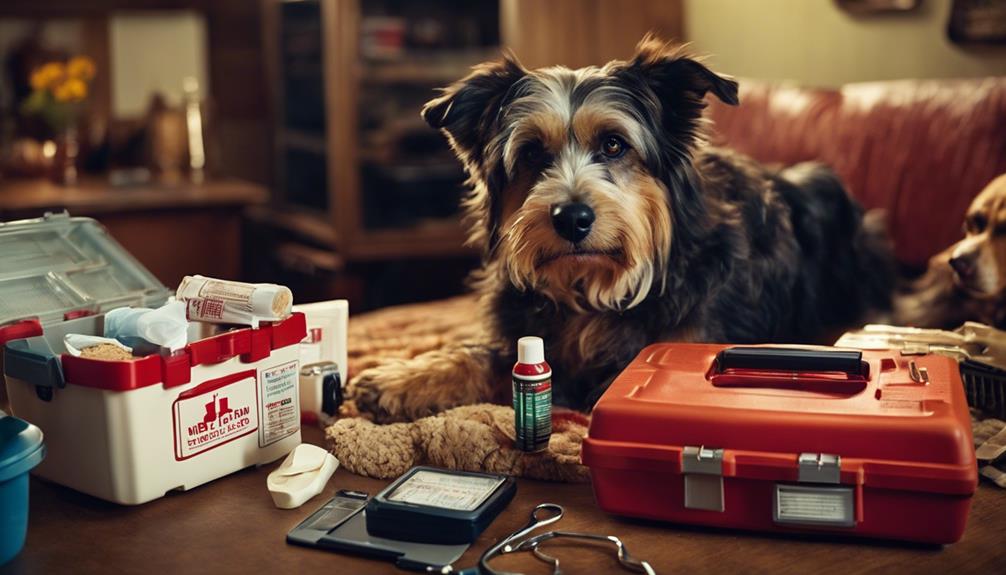
If your dog eats a burrito, act quickly and call your vet. Burritos might have ingredients like onions that are dangerous for dogs and could cause toxicity.
Monitor your dog for signs of trouble, such as diarrhea, weakness, vomiting, or not wanting to eat. These symptoms could mean your dog is sick.
Even if your dog seems fine initially, it’s critical to watch them closely. A veterinarian can check your dog and provide the proper treatment to help avoid any health problems from the burrito.
Consulting Your Veterinarian
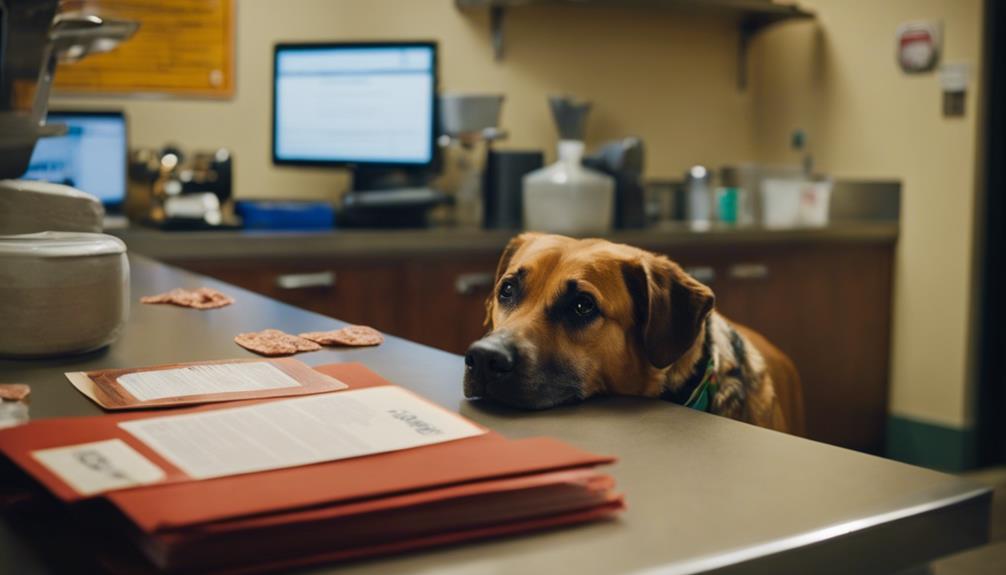
After your dog has eaten a burrito, watching for any signs of discomfort is critical. Then, talking to your vet is an essential follow-up to ensure your dog stays healthy and safe. Going to the vet helps lessen the dangers of eating a burrito.
- Risk Evaluation: Your vet will check for any signs of food poisoning or stomach issues.
- Monitoring Tips: You’ll get advice on what symptoms to watch after your dog eats something like a burrito.
- Prevention Tips: Your vet can offer tips on how to avoid these problems in the future.
- Healthy Snack Ideas: They can suggest dog-friendly homemade snacks or safe commercial treats.
- Personalized Guidance: When giving advice, the vet will consider your dog’s health, size, and age.
This approach ensures your dog can enjoy treats while staying healthy and happy.
Frequently Asked Questions
Can I Give My Dog a Burrito?
- Avoid giving your dog a burrito; it’s risky.
- Burrito ingredients can cause health issues in dogs.
- Choose safer food options for your pet’s well-being.
Can Dogs Have Taco Bell Burritos?
- Taco Bell burritos can upset dogs’ stomachs.
- Ingredients may be toxic to dogs.
- They cause nutritional imbalance.
Are Refried Beans OK for a Dog?
- Plain refried beans are OK for dogs.
- Avoid onions and garlic, as they’re toxic.
- Watch sodium and fat levels; consult a vet.
What if My Dog Ate Taco Meat?
- Watch for digestive issues and allergies after eating taco meat.
- Seek vet advice for safe dietary changes.
- Ensure balanced nutrition and proper portions.

